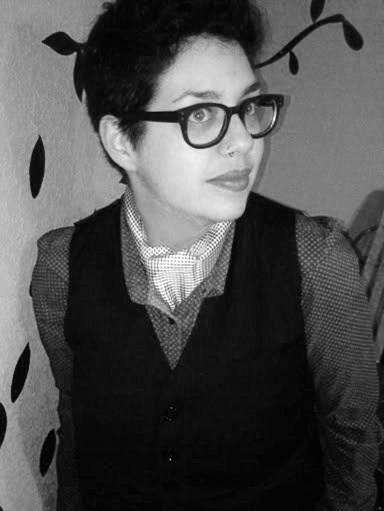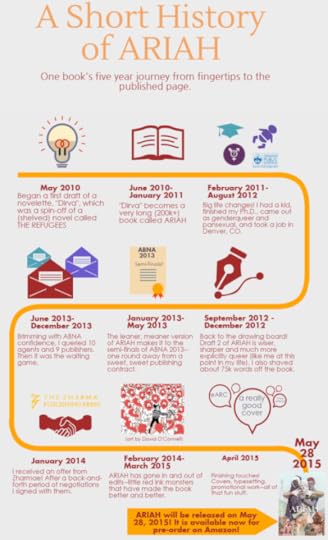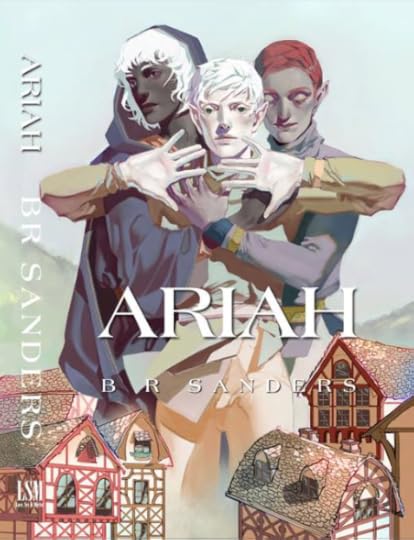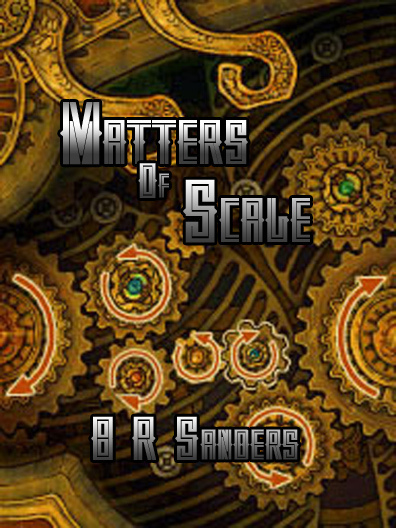B.R. Sanders's Blog, page 27
May 20, 2015
ARIAH Countdown: Building a Genderqueer Culture

click through to pre-order!
Being gay, lesbian or bisexual isn’t an issue. Homophobia is the issue. While it’s a significant problem in the real world, I think that leaving it behind in a fantasy world is a wonderful and empowering way to say that being gay really is OK.
The above quote was written by Malinda Lo in regard to her novels Ash and Huntress. She writes about how in creating the secondary fantasy worlds in which her queer characters live she as the writer was presented with a choice—are these worlds homophobic, or are they not? Will her characters experience stigma for their queerness, or will their queerness simply be another kind of love?
I read Lo’s article just this week, but it got me thinking about why and how I created one of the cultures within Ariah. Towards the end of the book, in desperate straits, Ariah is forced to wander the eastern grasslands where the nomadic Droma elves live. The Droma elves are a hunted people—taken as slaves by both the Qin Empire where Ariah himself hails from and by the pirate colonies to the south of the Empire. The fact that they are hunted makes them necessarily wary of outsiders. The fact that they trickle into the Empire as slaves means that Ariah, who has a great facility for languages, has already learned to speak Droma by listening to the slaves at market.
One thing about the Droma language that has fascinated Ariah long before he ever meets the Droma in the grasslands (he keeps his distance from the slaves) is that they do not define gender as he himself does (or as most people in the real western world do):
And there was the question of gender, too. At first, it seemed binaristic like most other languages, like Qin and Semadran. There were terms for male and female, differentiations I heard the slaves use for those not of their culture and for animals. But I never heard them use such distinctions towards themselves. It took me some time to parse it, but it became increasingly clear that the Droma did not understand themselves as men or women, but simply as people. The slaves in the city, likely as a means of survival, acknowledged that we divided ourselves as such, and they must have understood that we divided them that way, too, but in the conversations I overheard they only ever used variations on the word voe—the Droma word for “person”—to refer to other Droma and themselves. It fascinated me—how could something so fundamental and so obvious as gender go unseen among them? And what did it mean? How could I be myself without being a man? I wanted very much to understand it, but it was elusive and exotic and always just out of my reach. I couldn’t help but gender them while listening: that one is a male person who is speaking to a female person went my thoughts.
Once Ariah is out in the grasslands, his only hope of survival is to be adopted by a Droma clan. When, by a stroke of luck, he is adopted by a Droma clan, he is confronted with this question of gender (or, rather, the lack of it) again:
I remembered the strangeness of Droma gender. I tried very hard to ignore all the signs of biological sex, to see the child as a person, as voe. If I was to encroach on their lands and ask for their help in survival, I felt the least I could do was get this one basic thing right. But it was hard. It took a very long time before it was easy, or natural, and even then it was hard.
So, here’s the thing about the Droma: to many of you out there they may seem strange. To me, they don’t. I’m genderqueer. I would fit right in. I didn’t set out to build a culture around that, one where I would fit right in—and actually I probably would only fit in in terms of gender because I really hate moving and am otherwise unsuited to a nomadic lifestyle. But the Droma evolved into an agender/genderqueer culture in my worldbuilding quite naturally. When it came time to decide, explicitly, whether they had genders it was easy for me to decide that they didn’t, largely for the reasons that Lo cited above.
Being trans* and/or gender-variant isn’t an issue. Transphobia and unexamined binarism is the issue.
Now this is already a long post, I know, but if you want to know more about what I mean by that, feel free to keep reading. I take a very materialistic approach to worldbuilding, especially as it regards to gender roles within a given culture. And, historically, cultures marred by a lack of resources—cultures characterized by lack and want—develop into very rigid gendered structures. Protection of lineage, parentage, and all that.
But the opposite often proves true as well. If the population is small, and if resources are abundant, then there’s no pressing need to pay strict attention to gender—note that paying strict attention to gender is code for controlling women’s bodies. But it could also mean literally just noticing and codifying gender period.
So, for the Droma, for whom the grasslands provide plentiful resources, and for whom roles in the clan are divvied up based on age and skill, gender literally doesn’t come up. Food and other resources are shared. Childrearing is communal, so lineages are not tied to inheritance or wealth or even parentage the same way they are in, say, the Qin Empire. It is a culture in which gender does not make sense. Even though the Droma have the same biological plumbing as Ariah (as you and I do), it’s still a culture where gender as a social construct does not make sense.
One wonders what kind of culture shock this means for the Droma who get taken as slaves—this is not yet something I’ve explored in my writing. Something I do know is that it has created a kind of minor reverse culture shock in some of my beta readers. At least one of the quotes above was added in edits due to feedback received because a reader thought Ariah adjusted to the Droma’s concept of gender too quickly.
I’ve said before that I like speculative fiction’s ability to pose radical ‘what ifs’. I think this is one of those for me. What if such a culture existed? What would it be like? For me, those are powerful questions worth asking.


May 19, 2015
ARIAH Countdown: A Short History of ARIAH
Today’s post is essentially a post-mortem. This is a short history of how Ariah the book came to be written, and then how it came to be published. I am always interested in that kind of contextual backstory, so I thought maybe some of you out there might be interested in it, too. Remember, you can pre-order Ariah here!


May 18, 2015
ARIAH Countdown: What you missed on Radio Z

click through to pre-order!
In case you missed it, I was invited to participate in The Written Word, Zharmae’s weekly radio show. The live show took place yesterday afternoon, and the focus was on food in fantasy book. Both Christy Jones, author of Trinka and the Thousand Talismans, and I discussed food in fantasy literature in depth–everything from GRR Martin’s love of bacon to the way food symbolizes trust in fairy tales. The episode is definitely worth a listen, and you can hear it for free here!
I wanted to make sure my faithful blog readers were not left out of the Radio Z fun, though. On the show I shared this excerpt from Ariah:
I wandered east, endlessly east. After three days of travel, just as my supplies began to run out, I found a river and followed it further east. I survived mostly on edible water grasses and fish. I felt guilty about the fish until I managed to snare and eat a rabbit. I wept when I killed it and skinned it, and wept again when I ate it. It was a struggle to keep the meat down; the wrongness of it was overwhelming. Still, I needed the protein badly. After that first rabbit, I became carnivorous and killed and ate whatever animals I could.
This scene takes place nearly three-quarters of the way through the book. Ariah has faced capture, and has just managed to escape. By this point in the book the reader knows that Ariah was raised in a vegetarian culture–we have seen him turn down meat dishes politely, thoughtlessly, out of habit more than once.
Semadran culture, in which Ariah was raised, lives under the thumb of the Qin. The level of structural oppression the Semadran elves like Ariah live with due to the Qin leaks into every part of their culture–right down to the food they eat. They live in poverty, so richer and more caloric foods (like meat) are much harder for Ariah’s community to come by. Ariah’s people live in restricted neighborhoods with enforced curfews, far from the fresh markets, so food that spoils quickly is not practical, either. A plant-based diet is more practical.
But on an ethical/spiritual/political level (these things are tied together in complex ways for Semadran elves), there is another level of meaning here. Semadran elves are decidedly nonviolent, and this extends to their diet. In a social position where they find themselves mercilessly beaten, imprisoned, executed often by the Qin, one form of resistance may be a refusal to eat another being.
All of this rushes to the surface in this scene where Ariah, forced by circumstance, first eats a fish and later eats a rabbit. He has to do it. He has to eat that rabbit to stay alive. He knows this, but in the doing, he confronts a lifetime of enculturation. And he comes undone.
He comes undone, but his body overrides his shame and guilt. He so badly needs the nutrients and the protein that his hesitance is quickly overcome. This becomes the new normal for him at a pace which disturbs him.


May 11, 2015
The Written Word (Radio Z) – Ep. 28 Foods in Fantasy
Hey, friends! Have you ever wondered what I sound like on the radio? Now’s you chance to find out! I’ll be doing a guest spot on my publisher’s weekly podcast, The Written Word (Radio Z). This week’s episode will focus on Foods in Fantasy literature. Tune in!


May 9, 2015
ARIAH: Available for Pre-Order!
Ariah has an official release date: May 28! The fine folks over at the Zharme Publishing Press have already pre-listed it on Amazon, which means you can pre-order it in either ebook or print format! How exciting is that??
BUT, if you would like a sneak peek, we are hoping to launch the book with between 5-10 reader reviews up on Amazon on release day! We have eARCs (electronic Advanced Review Copies) available for interested readers/reviewers. If you’re interested, please email me and let me know if you would prefer a pdf, mobi or epub version of the book!
To whet your appetite, the blurb for the book is below:
Ariah’s magical training has been interrupted. Forced to rely on a mentor, Dirva, who is not who he claims to be, and a teacher who is foreign and powerful, Ariah is drawn into a culture wholly different from the elven one that raised him.
As his friendship with Dirva’s brother blossoms into a surprising romance, and he slowly learns how to control the dangerous magic in his blood, life finally appears to be coming together for Ariah—but love and security are cut short by a tyrannical military empire bent on expanding its borders.
War, betrayal, passion, and confusion follow Ariah as his perilous journey leads him beyond the walls of the Empire, and into unfamiliar territory within himself. Along the way, he’ll discover just how much he’s willing to give up to find his place in the world, and he’ll learn what it means to sacrifice himself for freedom—and for love.


May 4, 2015
Supernatural Haiku: 03×07 – Fresh Blood
May 1, 2015
New Pub: CARGO Out Today!
Cargo is officially released today! The book is being published by World Castle Publishing and is available for purchase on Amazon here in both print and ebook formats. Here’s the blurb:
Roake attracts bad luck like half-buried coins attract magpies. Roake is as clever and hard to kill as a weasel. Whenever his bad luck gets the better of him—whether it’s when his father sells him to the army or when the pirates capture him as a ship slave—Roake finds a way to survive the situation. Sometimes, that means running. Sometimes, that means staying put and playing the odds. Always it means taking a calculated risk.
In CARGO, Roake tells his own story. Roake tells us what he’s done and what’s been done to him to make sense of his life. Like every young man, he wants his choices to matter. He wants his friendships to endure. He wants to leave a mark. Telling his own story is how Roake does it.
Cargo has had a winding road from my fingers to the published page. The lead character of Cargo–Jarthen Roake–was originated by my partner, Jon, in a completely different form for a completely different story. He was the basis for an altogether different incarnation of the A Tale of Rebellion books. The secondary world of Aerdh, in which Cargo and A Tale of Rebellion are both set (along with my debut novel Resistance and my forthcoming novel Ariah) is still known as the Jarthenverse in my house in reference to young Mr. Roake. And yet, in the rewrites of A Tale of Rebellion, he wound up on the proverbial cutting room floor. This novella was written to let Jarthen have his moment, finally, in the spotlight.
It’s fitting, also, that Cargo is released on May Day. Labor, and the exploitation of it, is a central theme of Cargo. Over and over again Jarthen is commodified–he is treated not as a human being with dreams and desires and a mind, but a thing to be traded and bartered and used. He is treated as capital, and reduced to a sum in a ledger book, first by his own father, then by those he does not know, then, finally by people he has come to trust.


April 18, 2015
CARGO: Release Date, Cover Reveal, And eARCS!
Cargo has a home and a release date! It will be published by World Castle, and is up for pre-order on Amazon now! The official release date is May 1st, 2015.
BUT, if you would like a sneak peek, we are hoping to launch the book with between 5-10 reader reviews up on Amazon on release day! We have eARCs (electronic Advanced Review Copies) available for readers who are willing to post reviews on release day. If you’re interested, please email me and let me know if you would prefer a pdf, mobi or epub version of the book!
Cargo is a novella, so it’s a quick read, and it’s exciting, too: it’s got intrigue and pirates and grapples with Big Questions, all in under 20,000 words! To whet your appetite, the blurb for the novella is below:
Roake attracts bad luck like half-buried coins attract magpies. Roake is as clever and hard to kill as a weasel. Whenever his bad luck gets the better of him—whether it’s when his father sells him to the army or when the pirates capture him as a ship slave—Roake finds a way to survive the situation. Sometimes, that means running. Sometimes, that means staying put and playing the odds. Always it means taking a calculated risk.
In CARGO, Roake tells his own story. Roake tells us what he’s done and what’s been done to him to make sense of his life. Like every young man, he wants his choices to matter. He wants his friendships to endure. He wants to leave a mark. Telling his own story is how Roake does it.
Who wouldn’t want to get their hands on an early release copy of that?


April 13, 2015
New Pub: “Matters Of Scale” released by Inkstained Succubus Press!
I’m thrilled to announce that my novelette, “Matters Of Scale”, has been published as a stand-alone work by Inkstained Succubus Press! The issue is available for purchase here, and I encourage y’all to check it out! Here’s a synopsis of the story to whet your appetite:
Moshel has hidden himself away for years, trying to keep the emotions of others from driving him mad. It’s in mechanics alone that he can find relief, the reliable tick of clockwork his escape. It’s only when he meets his counterpart, Tovah, that he realizes all may not be as it seems in his world, and there may be a way to change it. It’s all a matter of scale.
First, many thanks to the lovely folks over at Inkstained Succubus. I was thrilled to work with them again! I wrote this story as a response to a call Inkstained put out for steampunk short stories about a year ago, and when I hear steampunk, I think clockworks, and when I think clockworks, I think about the Semadran elves in Aerdh, my secondary fantasy universe. And no Semadran elf is more Seamdran than Moshel Atoosa’Avvah.
Moshel was formally introduced in my debut novel, Resistance but I have been writing him as long as I have been writing fiction. Moshel is the very first character I fleshed out on my own, and his is the very first novel that I wrote by myself. It was terrible–maudlin and overwrought, and it will never see the light of day. But I cut my teeth on him. Over and over. And he’s evolved as I have evolved.
In his formal introduction in Resistance, readers meet Moshel as a middle-aged man, someone who knows himself well, who has figured out who he is and what he wants. He still has room to grow, to surprise himself, but he is a man in control of himself. In “Matters Of Scale”, Moshel is not there yet. He is young yet, just barely out of adolescence, and still grappling with the weight of his own mind. In Resistance, Moshel is an almost paternal figure for Shandolin–gracious and supportive and competent. But he wasn’t always like that. He chides her for being brash, but I’ve written him so long…I know Moshel. I know he had a brashness, once, too. And I saw a call for steampunk, and thought about clocksprings, and then I thought about Moshel, but young and out of control and struggling.
I’m glad this episode in Moshel’s history has come to light. I wonder what other bits and pieces of him have yet to surface.


March 31, 2015
#transdayofvisibility

this is me, being hella genderqueer because I know literally no other way to be
I identify as genderqueer. I identify as non-binary. My pronouns are they/them/their. I am transgender.
For me, being trans* means:
existing on a sliding scale of gender
having fought through years of social conditioning and outright oppression to figure out who I am
finally being comfortable in my own mind and body
being closeted at work for fear that I will be fired (there are no protections for trans* people where I am, and I am my family’s breadwinner)
speaking up about trans* issues at work anyway (it is a glass closet)
having my right to parent my child called into question
building a community of other trans* and gender-variant people who fucking get it
valuing the cisgender allies I have in my life who, by some miracle also fucking get it
Writers’ personal experience seeps into what they write, sometimes on purpose and sometimes inadvertently. I am a trans* writer–I am also a white writer, and a writer with a complicated class history and a queer writer and a writer who struggles with mental and physical disabilities. All of these things shape the form and the content of my writing. My interlinked identities inform the kinds of characters I create, the worlds they live in and the words they speak.
I am proud to be a trans* writer. I hope to breathe life into trans* characters who are real, who speak to other trans* people, who contribute to a body of literature that is growing and blossoming and making a whole community of people who have always been here, but who have always been pushed to the margins finally visible. We are here. We have always been here. We will always be here.












